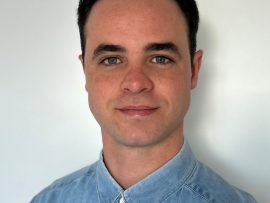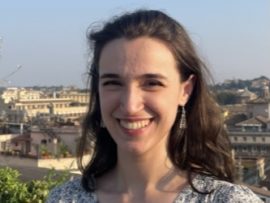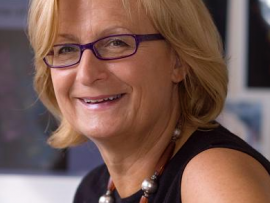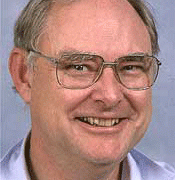Dr Madeline Lancaster
Dr Madeline Lancaster is a Group Leader in the Cell Biology Division of the Medical Research Council Laboratory of Molecular Biology (LMB), part of the Cambridge Biomedical Campus in Cambridge.
Dr Lancaster studied biochemistry at Occidental College, Los Angeles, USA, before completing a PhD in 2010 in biomedical sciences at the University of California, San Diego, USA. She then joined the Institute of Molecular Biotechnology of the Austrian Academy of Sciences (IMBA) in Vienna, Austria as a postdoctoral researcher where she developed the first cerebral organoids, before joining the LMB in 2015.
Research in the Lancaster Lab focuses on human brain development using stem cells to generate brain organoids that allow modelling of human brain development in vitro. The laboratory studies the most fundamental differences between human brain development and that of other mammalian species. The lab also studies cellular mechanisms underlying neurodevelopmental disorders such as autism and intellectual disability.
Select awards
- Elected EMBO member, 2022
- Blavatnik Award for Young Scientists in the United Kingdom, Laureate in Life Sciences, 2022
- Vallee Scholars Award, 2021
- ISSCR Dr Susan Lim Award for Outstanding Young Investigator, 2021
Select publications
- Kelava I, Chiaradia I, Pellegrini L, Kalinka AT, Lancaster MA. Androgens increase excitatory neurogenic potential in human brain organoids. Nature. 2022 Jan 19. Online ahead of print.
- Hoffman PC, Giandomenico SL, Ganeva I, Wozny MR, Sutcliffe M, Lancaster MA#, Kukulski W#. Electron cryo-tomography reveals the subcellular architecture of growing axons in human brain organoids. eLife. 2021. Oct 26;10:e70269. #Co-senior author.
- Benito-Kwiecinski S, Giandomenico SL, Sutcliffe M, Riis ES, Freire-Pritchett P, Kelava I, Wunderlich S, Martin U, Wray G, McDole K, Lancaster MA. An early cell shape transition drives evolutionary expansion of human forebrain. Cell. 2021. Mar 19:S0092-8674(21)00239-7.
- Giandomenico SL, Sutcliffe M, Lancaster MA. Generation and long-term culture of advanced cerebral organoids for studying later stages of neural development. Nat. Protocols. 2020. Feb;16(2):579-602.
- Chiaradia I, Lancaster MA. Brain organoids for the study of human neurobiology at the interface of in vitro and in vivo Nat Neurosci. 2020. Dec;23(12):1496-1508.
- Pellegrini L, Mallery DL, Paul D, Carter AP, James LC, Lancaster MA. SARS-CoV-2 infects the choroid plexus and disrupts the blood-CSF-barrier in human brain organoids. Cell Stem Cell. 2020. Dec 3;27(6):951-961.e5.
- Pellegrini L, Bonfio C, Chadwick J, Begum F, Skehel M, Lancaster MA. Human CNS barrier-forming organoids with cerebrospinal fluid production. Science. 2020 Jul 10;369(6500).
- Giandomenico SL, Mierau SB, Gibbons GM, Wenger LMD, Masullo L, Sit T, Sutcliffe M, Boulanger J, Tripodi M, Derivery E, Paulsen O, Lakatos A, Lancaster MA. Cerebral organoids at the air-liquid interface generate diverse nerve tracts with functional output. Nat Neurosci. 2019. Apr;22(4):669-679.
- Lancaster MA#, Corsini NS, Wolfinger S, Gustafson EH, Phillips AW, Burkard TR, Otani T, Livesey FJ, Knoblich JA#. Guided self-organization and cortical plate formation in human brain organoids. Nat Biotechnol. 2017 May 31. Co-corresponding author.
- Renner M, Lancaster MA, Bian S, Choi H, Ku T, Peer A, Chung K, Knoblich JA. Self-organized developmental patterning and differentiation in cerebral organoids. EMBO J. 2017 May 15;36(10):1316-1329. *Equal contribution.
- Sutcliffe M, Lancaster MA. A Simple Method of Generating 3D Brain Organoids Using Standard Laboratory Equipment. Methods Mol Biol. 2017 Mar 31.






